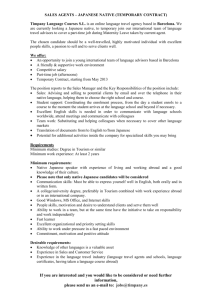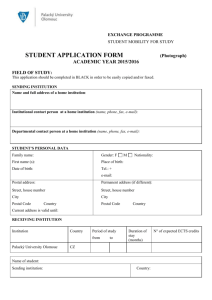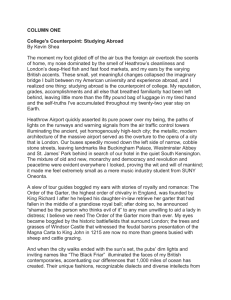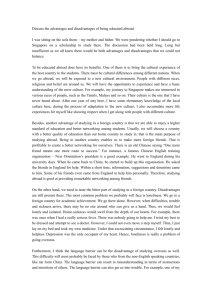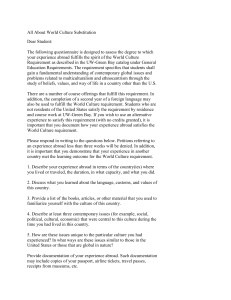Japanese Studying Abroad: Motivation and Trends
advertisement
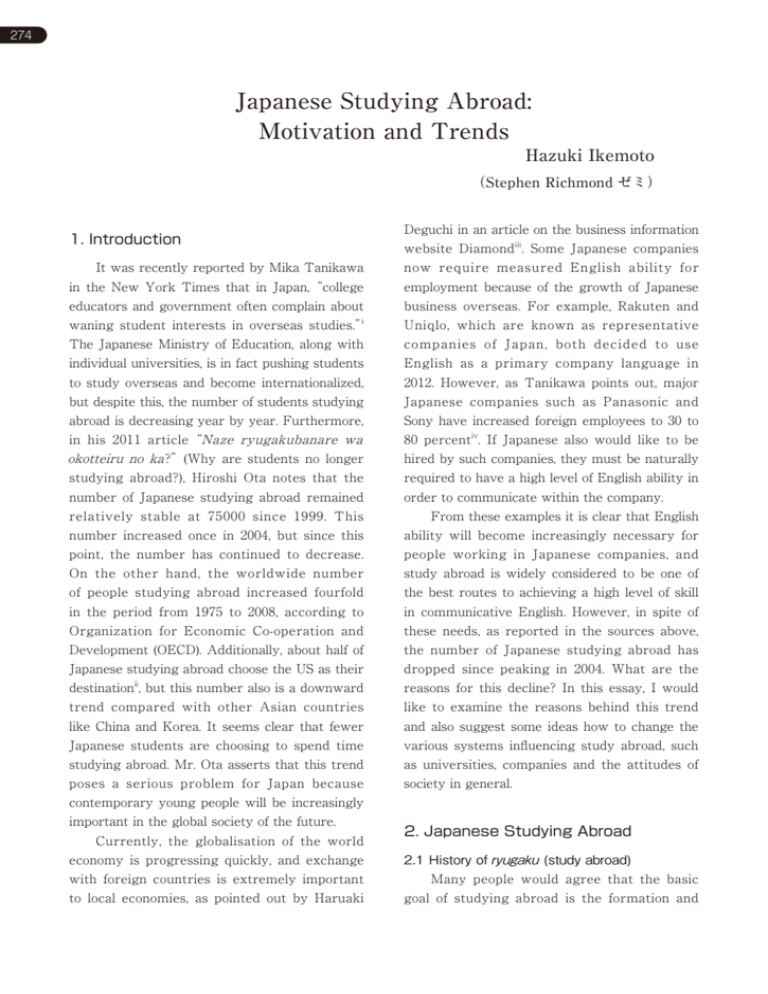
274 Japanese Studying Abroad: Motivation and Trends Hazuki Ikemoto (Stephen Richmond ゼミ) Deguchi in an article on the business information 1. Introduction website Diamondiii. Some Japanese companies It was recently reported by Mika Tanikawa now require measured English ability for in the New York Times that in Japan,“college employment because of the growth of Japanese educators and government often complain about business overseas. For example, Rakuten and i waning student interests in overseas studies.” Uniqlo, which are known as representative The Japanese Ministry of Education, along with companies of Japan, both decided to use individual universities, is in fact pushing students English as a primary company language in to study overseas and become internationalized, 2012. However, as Tanikawa points out, major but despite this, the number of students studying Japanese companies such as Panasonic and abroad is decreasing year by year. Furthermore, Sony have increased foreign employees to 30 to in his 2011 article“Naze ryugakubanare wa 80 percentiv. If Japanese also would like to be okotteiru no ka ?”(Why are students no longer hired by such companies, they must be naturally studying abroad?), Hiroshi Ota notes that the required to have a high level of English ability in number of Japanese studying abroad remained order to communicate within the company. relatively stable at 75000 since 1999. This From these examples it is clear that English number increased once in 2004, but since this ability will become increasingly necessary for point, the number has continued to decrease. people working in Japanese companies, and On the other hand, the worldwide number study abroad is widely considered to be one of of people studying abroad increased fourfold the best routes to achieving a high level of skill in the period from 1975 to 2008, according to in communicative English. However, in spite of Organization for Economic Co-operation and these needs, as reported in the sources above, Development (OECD). Additionally, about half of the number of Japanese studying abroad has Japanese studying abroad choose the US as their dropped since peaking in 2004. What are the destinationii, but this number also is a downward reasons for this decline? In this essay, I would trend compared with other Asian countries like to examine the reasons behind this trend like China and Korea. It seems clear that fewer and also suggest some ideas how to change the Japanese students are choosing to spend time various systems influencing study abroad, such studying abroad. Mr. Ota asserts that this trend as universities, companies and the attitudes of poses a serious problem for Japan because society in general. contemporary young people will be increasingly important in the global society of the future. Currently, the globalisation of the world economy is progressing quickly, and exchange 2. Japanese Studying Abroad 2.1 History of ryugaku (study abroad) with foreign countries is extremely important Many people would agree that the basic to local economies, as pointed out by Haruaki goal of studying abroad is the formation and 275 Japanese Studying Abroad: Motivation and Trends completion of character. The history of studying of scholarship, gaining experience in foreign abroad in Japan is long, and new knowledge lifestyles, and studying abroad systems were and skills have been introduced into Japan by institutionalized by major companies. From international students from foreign countries the 1960s, when Japan began to experience since ancient times. In ancient Japan, both kanji rapid economic growth, private students characters and Buddhism crossed to Japan from became wealthy enough to travel abroad, but China and the Korean Peninsula, but the political high exchange rates make foreign travel and powers only began the dispatch of Japanese study too expensive for most Japanese. More students to China in the late sixth century. Five people became able to go abroad with each young nuns were sent to Baekje, the state of the goal, and this became more accessible in 1985. ancient Korean Peninsula, for the first time in These purposes are similar to current one, for 588. They returned safely, but traveling overseas example, language study, the working holiday was still a dangerous endeavor at the time, since aimed at gaining life experience, and to acquire shipbuilding technology was still in its infancy. qualifications. While studying abroad in the In the Heian period (794-1185), studying abroad modern era was seen as a means of gaining for a short time became a more mainstream a fuller personality for many Westerners, pursuit. The costs involved in travel and study for countries like Japan as it was aiming at were covered by the state. In the 12th century, modernization, it also a way to developing many Buddhist priests successively visited Song civilization and society through the adoption of Dynasty China as a result of increased interest foreign ideas. in Buddhism. On their return, other domestic priests were strongly influenced by them and 2.2 Recent trends studying abroad became increasingly popular. The graph in Figure 1 shows the change However, in the Muromachi period (1336-1573), in numbers of Japanese studying abroad crossing to China was prohibited, except for between the years 1983 and 2010. The vertical some temporary Japan-China trade. Up until axis represents number of students, while the this point, Japan had sent people as international horizontal axis shows the years. students only to Asian countries, such as China. According to Japanese studying abroad However, the Edo Shogunate began dispatching figures tallied by the Ministry of Education, the international students to Holland in 1862, and number of Japanese people studying abroad also to European countries, such as Britain and reached record highs by 2002, but grew at France. In 1866, the Edo Shogunate permitted a sluggish pace after that. 2004 saw a peak Japanese citizens to travel overseas for the number of 83,000 students leaving Japan, with purpose of study. During the Meiji period (1868- major destinations being the United States, 1912), systematized overseas study was one China, and the United Kingdom. of the more important national policies, due to What is the reason behind this drop in the government's aspiration for modernization numbers? Tsuyoshi Saito, the author of a and westernization. Some well-known public news report on Benesse education website, figures experienced study abroad during this commented that some people assume that the period, such as Prime Minister Hirobumi Itou, number of people studying abroad also deserves and novelists Souseki Natsume and Ougai Mori. to have decreased every year because the After World War II, there were a number of number of young people has decreased because academics studying abroad through a system v of the dwindling birthrate . However, compared 276 Figure 1. Number of Japanese studying abroad, by year. (Source: Ministry of Education, Culture, Sports, Science and Technology-Japan) with 2010 and the peak year 2004, the number studying abroad and gaining communication of people studying abroad decreased by 30%, skills in foreign languages. It is widely believed while the number of people entering university that studying and living in foreign countries actually rose. In other words, about decrease is remarkably helpful as ways of not only in the number of young people wanting go increasing one's communication ability, but also overseas is irrefutable. broadening one's outlook. Meanwhile, with the globalization of business developments, Japanese companies 2.3 Reasons for decline began competing with the rest of the world, In this section I would like to individually rather than just within Japan. According address some of the reasons that have been to a survey conducted in February 2012 by given for the decline in outbound student Japanese job information site DISCO , 22% of numbers. 1245 companies answered that they are plan to employ people who has experienced studying 2.3.1 Financial reasons abroad, up ten points from the previous survey. Some have commented that the decrease Besides, the percentage of Japanese companies in numbers of Japanese studying abroad is that consider that studying abroad does not linked to economic reasons. For example, Hitomi influence employment opportunity declined to Okazaki, on the employment information website 60% in 2010 from 72% in 2006. People who are Riku-nabi said that“one reason for (students) able to be globally active seem to be increasingly staying put was financial, given the state of the needed by companies which aim to branch out economy, especially since tuition in countries like overseas in the future. Therefore, university the United States is soaring.”vii students especially need the experience In 2010, only 58,000 Japanese students 277 Japanese Studying Abroad: Motivation and Trends studied outside the country, in a large decrease cost of studying abroad for reasons such as cuts from the record high of 83,000 achieved during in their parents' annual earnings. There is data the 2004 academic year. This decrease might that indicates that the higher a parents' annual be largely due to the struggling economy which salary, the greater the children's the four-year affected families and increased their financial university entrance rate increase xii. There are burdens, including those of paying for their currently scholarship systems, such as the one children's education. Instead of pursuing further created and run by the Japan Student Services education abroad, students concentrated on Organization, but ultimately, parents' income has viii finding jobs to help out their families . a huge influence on the prospective academic According to the popular website Ryugaku courses of their children. On current figures, Journal, which provides information in Japanese parents who have a child entering four-year on visiting foreign countries for study or for university have to pay about 450 million yen for work, the average cost for a language study admission and tuition fees over four yearsxiii, and abroad (tuition and travel expenses combined) some of them need to send additional allowance totals between 160 million to 300 million money for children to live by themselves. yen per person per year. ix According to the Given this data, and Japan's current economic Ministry of Education, popular study abroad climate, it is easy to guess that a large number destinations among Japanese students are of families have to cut back on studying abroad the United States of America, China, Britain, because of financial reasons. Australia, and Taiwan x . Hiroshi Ota, in his piece Naze ryugakubanare wa okotteiru no ka? 2.3.2 English language ability (Why are students no longer studying abroad?), According to an article in the ICEF Monitor , states that one of the reasons for decrease in a dedicated market intelligence resource for number of people studying abroad is the high the international education industry, anxiety cost of university tuition in English-speaking language barriers were commonly a cited countries. For instance, at many influential reason among students' disinterest in study American universities, students require at least abroadxiv. Besides, Ota Hiroshi points out a delay fifty thousand dollars for their total expenses in the development of international education Moreover, they are required to exchange programs at Japanese universitiesxv. demonstrate their amount of money more than Compared with other countries, international this cost as certification of bank account when program development at Japanese universities applying to studying abroad, so the average is often delayed. This is nothing less than a per year. xi Japanese family has extreme difficulty letting lack of effort on the part of the institutions to their children go abroad while the Japanese attract students to studying overseas. As a economy is flagging and savings are low. major problem of Japanese higher education, According to a research paper published by the delay of university globalization is a major the Inter-University Seminar for the Future of issue, but such case focuses mainly on small and Japan (ISFJ), a student policy forum, it is also midsize private universities. Furthermore, there supposed that one of the reasons for decrease in is little government support for most of these study abroad numbers is an increase in students cases. The government's support is more likely who are forced to give up study abroad plans to focus on high level universities, but appealing on economic grounds. Researchers assume an programs of studying abroad, including short increase in students who cannot cope with the term ones, are still not adequately developed. In 278 addition, the number of programs in which one some comments from Naoki Ogi, a professor of is able to have plural degrees (double degree) education at Hosei University in Tokyo, about through studying abroad while in university is fewer Japanese students studying abroad. He extremely small. Although this program is now has compiled his own theory of why this is a world trend, the Ministry of Education still the case. Young Japanese were increasingly has not accepted it. On the other hand, we are becoming introverted and risk-averse, Mr. Ogi required a certain level of TOEFL and TOEIC said, and were unwilling and ill-prepared to take tests to study abroad. According to Ryugaku on new challenges. He added that he believed Jaanaru , students need a score of between 46 their lack of interest in going abroad was part to 80 in the TOEFL iBT in order to attend a of that growing unease with the unknown foreign college or four-year university. The and challenging situations. According to Mr. transition to TOEFL iBT was completed in Ogi,“They (Japanese students) are growing 2006, and it became an integrated test of four mentally weak and feeble and some even lack language skills: reading, listening, speaking and xvii basic survival instincts.” Recently, it is often writing. It is not only the relative difficulty of commented in the media that Japanese youth the question gets higher, but also grammatical are becoming increasingly inward-oriented. questions are excluded. Moreover, since Compared with other Asian students, the speaking tests which Japanese students have number of Japanese students studying abroad been traditionally poor at, were added, it become has decreased. It is said that young Japanese harder to attain high score without special have lost interest in foreign countries from this preparation lectures. In fact, figures quoted by tendency, and words such as uchi-muki (inward- Ota show that the average English speaking test looking) and soshoku-ka (‘herbivorous’, meek score of Japanese test-taker is the lowest level of people) are often quoted in the media. This the countries sampled, while writing test scores lack of energy and motivation is apparent even xvi are also second-lowest . High level universities to foreign students in Japan. An example is in English-speaking countries tend to demand an Hochuen Kwan, a study abroad sophomore at appropriately high level of English ability for all Waseda University in Tokyo, who opines that exchange students, but the number of Japanese Japanese university students do not use much students who cannot fulfill the requested score, energy in studying hardxviii. even if they want to study abroad, is increasing. However, according to a survey prepared Besides, some indicate that the difficulty of by a study group of Yoshio Higuchi at Keio the new TOEFL test leads to an avoidance of University, though young Japanese are said English language study and studying abroad. to have a lack of interest of foreign countries, Meanwhile, the English ability of both Chinese their interest in studying abroad remains high. and Korean students is improving steadily, Consequently, it is concluded in the article and study abroad prerequisites are not such “Nihonjin daigakusei no ryugaku sokushin a serious problem as in Japan. It is therefore seisaku (A Study Abroad Promotion Policy necessary, according to Ota, to reconsider for Japanese University Students)” that the Japanese English education fundamentally from decreasing trend of study abroad is not fully this point of view. explained by this, and it is more rational to take action to promote study abroad based on other 2.3.3 Lack of interest in foreign culture/language known barriers. In his article, Akira Kobayashi, The New York Times article reported professor at Meiji University in Tokyo, states 279 Japanese Studying Abroad: Motivation and Trends that his students whom he contacts routinely and cultures. Ota claims that it is possible are quite overseas-conscious and hope to have that young Japanese have lost admiration and the chance to study abroad regardless of the interest for foreign countries, due to a highly- length of time, while at universityxix. Thus it developed culture exchange and increasing seems that a decrease in student motivation is school trips to foreign countries. A more affluent not as significant factor as it is sometimes made and open Japan means that study abroad has out to be. lost its novelty. Kobayashi believes that he most important problem is how much a university understands students’circumstances and employs concrete xx 2.3.5 Job-hunting schedule clash Many educators and experts state that ideas to enable study abroad opportunities . another cause of the decrease in study abroad The international society is a community numbers lies in the job hunting practices of in which people should co-exist across their graduating students.“A likely reason for the fall different cultures. Japanese universities have in the number of students studying abroad is a a responsibility to get students who do not fear among students that if they study abroad, want to go overseas interested in study abroad, they may lose the chance to find employment but that vision is not necessarily shared by when they come back to Japan from their all parties at universities. Universities are studies”,stated the editorial in The Japan Times generally supportive of study abroad fairs, Weekly in 2011 counseling, orientation for students hoping to xxiii . Since 1996, the job hunting process starts study abroad, but Kobayashi suspects that in in the autumn of university students' third general, information provided by universities is year and reaches its peak by the end of that insufficient, especially for students who are not year at all fourth-year universities. As a result, interested in study abroad to begin with, but students are disinclined to take time off from xxi have the means and opportunity to participate . this to study abroad. Additionally, since all new The question remains then, what are recruits are hired and begin at the same time, young Japanese interested in? They invest their it is extremely difficult to try looking for a job limited funds in various choices such as hobbies, after going through studying abroad experience, education, and entertainment. As a result, the when one's fellow students have already secured value of studying abroad may have fallen down employment. their lists of priorities. The survey result of affairs of university graduating students who found a job in 2010 2.3.4 Image of foreign countries by the Ministry of Education is 57.6% and Ota mentions in his article the convenience this percentage declines no less than 4.9%, of modern Japan as one of the reasons for fewer compared to the previous year. Risk awareness Japanese studying abroad. xxii The economic with regards to employment appears to be miracle of postwar Japan gave rise to a increasing, and Akira Kobayashi sees this convenient and comfortable society- a situation as a key problem. Additionally, the gradual that is sometimes hard to leave. Ota believes lengthening of the job hunting process adds to that the younger generation is not finding value students' anxiety about the continuing economic in taking the trouble to open up to difficult downturn upward financial crisis. In 2012, in situations which arise when attempting to response to this problem, the Japan Business understand a wide variety of foreign customs Federation announced that they will push 280 forward the start of the job hunting season but students with study abroad experience from October 1 st to December 1 st. However, report that rather than these, financial and Mr. Kobayashi said that this level of shift is English language issues pose more problems. quite unlikely to be recognized by students as Many students who do not end up studying a direct and immediate solution to the study abroad seem have given up the idea of going abroad conundrum. Therefore, students tend to through fear of having their job hunting schedule step up their efforts in studying for additional postponed.xxvi It is also reasonable to assume that qualifications, and studying abroad is now some students studies abroad in spite of these becoming an unpopular option in their busy shortcomings. student years. In addition to seasonal problems, In order to revive interest in study the study group of Yoshio Higuchi reports that abroad, perhaps it would be useful to support students sometimes believe that studying abroad universities and society local organizations. has no value if it is not seen to directly influence Yoshio Higuchi's Association suggests that their prospect of employmentxxiv. The promotion contemporary Japanese companies need to of studying abroad has no meaning if Japanese give greater recognition to the study abroad society does not understand the importance of experience of students, and make allowances for making use of students' study abroad experience. this during job hunting. Study abroad is vital for It is fair to suppose that society's attitude Japanese students, and consequently, the future toward study abroad experience is ambiguous. of the country in a globalised society. Since Hiroshi Ota says that he interviews recruitment Japan is an island nation with its own language staff and students taking part in job interviews and culture, study abroad experience remains who not think that companies rate students' one of the few methods by which Japanese can xxv . In the past, interact with the rest of the world. Of course, there was a sense that the Japanese economic the rise of the internet and the communication experiences of studying abroad recession gave meaning and motivation to study channels it provides has lessened the need abroad; however, this is no longer necessarily for study abroad, but this alone is not enough. the case. The Japan Times Weekly points this out in no uncertain terms:“The government and private 3. Conclusion As we have seen, there are numerous sector must realize that a decline in the number of students studying abroad could have a xxvii devastating effect on the future of Japan”. possible reasons for the recent decline in Japanese students' interest in study abroad. These include financial reasons, falling English i Tanikawa Mika, Fewer Japanese Students Studying ability, lack of interest in foreign culture and Abroad , The New York Times, February 20, 2011 language, and clashes with job-hunting schedule. Of these, the most pressing would seem to be ii Ota Hiroshi, Naze ryugakubanare wa okotteiru no a harmful effect of increased time, energy and ka? (Why are students no longer studying abroad?), money being expended by students in their job- Kyoiku to Igaku (Education and Medicine), 59(1):69 hunting efforts. According to Yoshio Higuchi survey, the problems of financial resources iii Deguchi Haruaki, Wakamono ga kaigairyugaku and poor English ability are both significant wo shitagaranai genin ha nihonkigyou no bottlenecks in allowing students to study abroad, uchimukitaishitsu ni aru. (Reasons for youth not 281 Japanese Studying Abroad: Motivation and Trends studying abroad lies in the nature of Japanese companies.), Daiamondo Online homepage (http:// xiv Interest in study abroad picking up again in Japan, diamond.jp/articles/-/15920) (accessed 3 January, ICEF Monitor homepage, September 17, 2013, 2014) (accessed September 20, 2013) iv Tanikawa xv v S a i t o T s u y o s h i , K a i g a i r y u g a k u n o g e n s h o xvi Ota, p34 Ota, p71 hauchimuki no sei dake? (Is students' introspection the only reason for decrease in study abroad xvii Tanikawa numbers?), published March, 2013, Benesse homepage (http://benesse.jp/blog/20130325/p2.html) xviii ibid (accessed January 3 , 2014) xix Kobayashi Akira, Nihonjingakusei no kaigairyugaku vi Sankei News, published May, 2012, (http://de-wa- sogaiyoin to kongo no taisaku (Obstructive factors news.iza.ne.jp/blog/entry/2681301/) (accessed on study abroad for Japanese students and future January 3, 2014) policy), Ryugaku Koryu (Study Abroad Exchange), Vol.2, p7 vii Tanikawa xx ibid, p7 viii Ida Torres, Government to encourage more Japanese college students abroad, The Japan Daily xxi ibid, p14 Press, May 7, 2013 xxii Ota, p74 ix Ryugaku Jaanaru (Journal of Study Abroad) homepage (http://www.ryugaku.co.jp/) (accessed xxiv December 2, 2013) xxv Higuchi, p16 Ota, p36 xxvi x ibid The Japan Times Weekly Editorial, "Fear of studying abroad," Published January, 2011, The Japan Times Weekly Online (http://weekly. xi Ota, p72 japantimes.co.jp/ed/fear-of-studying-abroad) (accessed September 14, 2013) xii Kokosei no shinro to oya no nenshu no kanren ni tsuite (On the correlation between high school students’graduate pathways and parents’income). Tokyo University Graduate School of Education, 2009 xiii Higuchi Yoshio, Shintaku Hiroki, Takahata Mami, Tsuda Ayana, Netsu Syunsuke and Fujimori Tatsuya, Nihonjin daigakusei no ryugaku sokushin seisaku. (Study abroad promotion policy for Japanese university students.), p14

